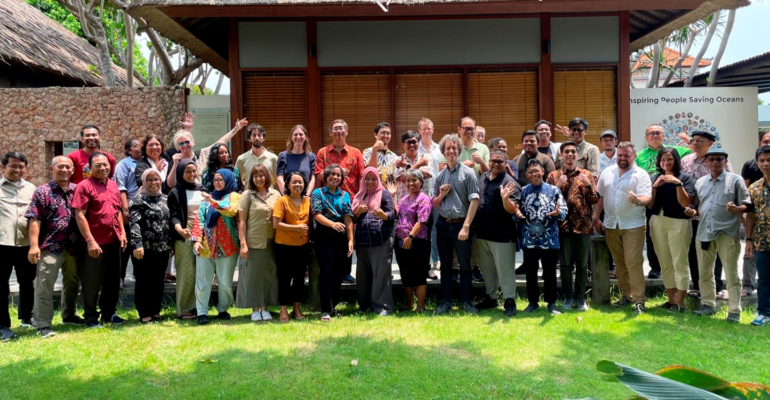Preserving Coral Reefs, FPIK IPB University Actively Participates in the INREEF Workshop

A total of five IPB University delegates actively participated in the Interdisciplinarity Program to Build the Resilience of Marine Protected Areas in Tourism Destination (INREEF) Workshop 2024 related to Monitoring and Tourism in Marine Protected Areas. The workshop was held recently at the Coral Triangle Center in Sanur, and Nusa Lembongan Island.
The event served as an important platform to engage local Indonesian stakeholders and encourage knowledge exchange. It aimed to lay the foundation for future collaborations, providing a forum to collectively face the challenges of coral reef resilience in Indonesia, which is the world’s center of coral reef diversity.
INREEF is a collaborative program designed to identify and develop tools to analyze, monitor, and regulate the resilience of Marine Protected Areas (MPAs). The goal is to safeguard coral reefs amidst the challenges posed by tourism fluctuations and climate change.
“The INFREE program is one of the international cooperation programs between Wageningen University and Research, the Netherlands chaired by Dr Lisa Becking and IPB University that utilizes strong networks and strategic international transdisciplinary partnerships involving knowledge institutions, non-governmental organizations (NGOs), government agencies, and the private sector,” said Prof Fredinan Yulianda, Dean of the Faculty of Fisheries and Marine Sciences (FPIK) IPB University.
“Tourism and conservation should be two things that have a positive impact on ecology and the environment, but currently they are often contradictory,” said Prof Fredinan, delivering a presentation at the workshop.
He explained that fifty percent of the world’s coral reefs have been lost due to global climate change and local pressures from fishing and pollution. “But there is still hope because there is growing evidence that the resilience of remaining coral reefs can be strengthened by adaptive management strategies that reduce local stressors,” he said.
“MPAs are commonly used to protect coral reefs and serve as reservoirs of biodiversity for larger areas, as well as to sustain livelihoods. MPAs consist of ecosystems, social systems, and governance arrangements to limit access and distribute benefits,” Prof Fredinan explained.
Meanwhile, Rili Djohani, Executive Director of the Coral Triangle Center (CTC) revealed, “Tourism activities in Nusa Penida are very different during and after the Covid-19 pandemic, this can be proven by the number of tourist boats that are active around Manta Point,” she said.
Delegates who attended representing IPB University included the Dean of the Faculty of Fisheries and Marine Sciences, Prof Fredinan Yulianda, Chairman of Marine Science and Technology Department, Dr Syamsul Bahri Agus, Secretary of Marine Science and Technology Department, Dr Beginer Subhan, and two young lecturers, Riza Pasaribu and Dea Fauzia Lestari.
In addition, this activity was also attended by several partners such as the University of Papua, Ministry of Marine Affairs and Fisheries (KKP), National Research and Innovation Agency (BRIN), Coral Triangle Center (CTC), Yayasan Konservasi Alam Nusantara (YKAN), World Wide Fund for Nature (WWF) Indonesia, Raja Ampat Research and Conservation Centre (RARCC), Konservasi Indonesia (KI) and Misool Foundation. (Dea/Lp) (IAAS/FAE)



